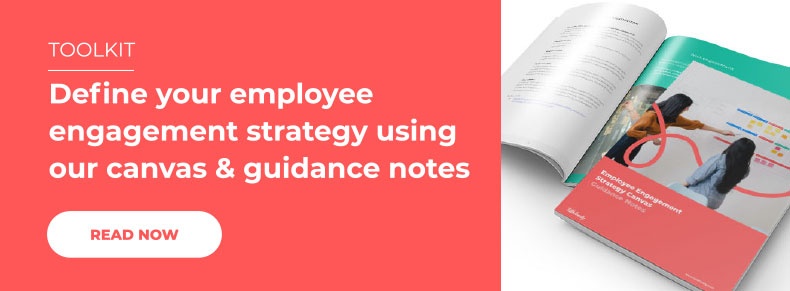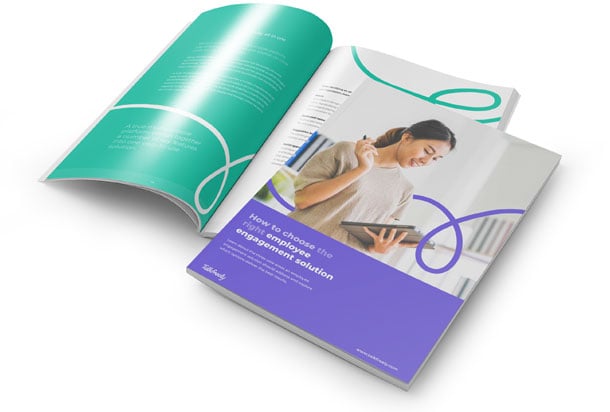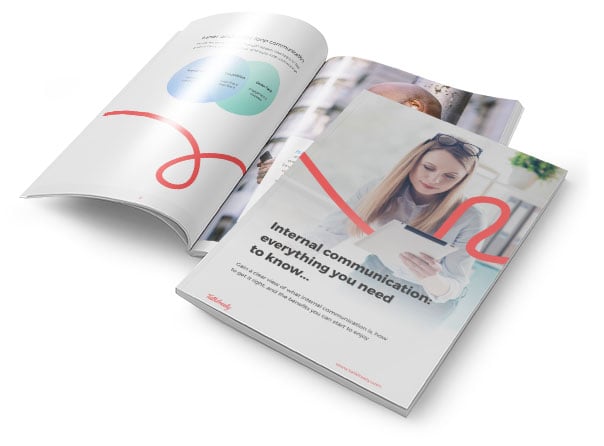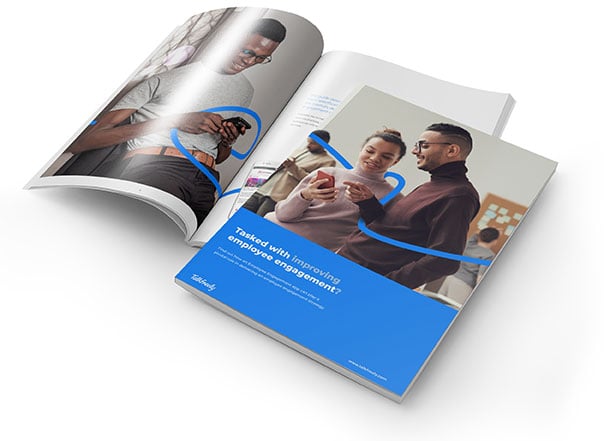Where are you working tomorrow? It’s the new water-cooler question that starts most office conversations. Hybrid working is now the norm for most organisations, from large multinationals to small enterprises. And while there are many plus points about this mix of in-person and remote work, it also raises concerns about its impact on our working lives.
The transition to hybrid working can be a rocky road. Video conferencing systems need to be up to the task, half-empty offices can feel dispiriting, and coordination with remote teammates often falls through the cracks. In the meantime, that all-important unifying element of employee engagement can suffer. During times of uncertainty, organisations - understandably - knuckle down into ‘survival mode’ and focus on a narrow tunnel of priorities at the expense of other vital elements. The importance of employee engagement can be overlooked, particularly when managing urgent organisational issues, such as employee safety and technological upgrades.
There is evidence to support the importance of employee engagement during periods of difficulty and subsequent recovery. Research by Akhmetshin et al. reveals that employees are a key resource in successfully getting through a crisis. The researchers also found that digital technologies play an increasingly significant role in supporting organisations’ communications strategies. It seems that employee engagement could be the key to surviving this ongoing period of transformation with both employee motivation and profit margins intact.
The Psychological Contract: The Importance of Staff Engagement
So why is employee engagement important during challenging times? The way companies engage with their employees has a significant impact on the psychological contract between employees and employers. Breaches of that contract can result in a decrease in employee engagement and motivation.
Since March 2022, the goalposts have been shifting on a regular basis. First, we had to work from home, then we had to return to the office, and now we are required to navigate the complexities of a hybrid working arrangement. It’s no surprise that many employees feel the psychological contract is under threat.
When employees have to endure a lot of pressure, as they have done during the pandemic, they become scared, feel isolated and worry about their families. As organisations move towards a new hybrid version of their working arrangements, people’s thoughts will shift to coping with the changes made to operational practices. They will be hoping that what their employer has introduced will be effective and wondering if everyone will keep their jobs in the future. The continuing uncertainty in the economy only exacerbates this concern. The reason why employee engagement is so important at times like these is that it can help to settle these issues in the minds of the workforce.
The one element that affects the psychological contract more than anything else is communication. An article by the Local Government Association states that internal communications are vital during change, and should be owned by everyone. It also suggests that employees no longer wait patiently during times of transition for ‘messages from on high’; they use their own internal networks to get information from those likely to know more and collaborate through social media.
Wouldn’t it be better to capture those lines of communication through a user-friendly employee engagement app rather than having them occur outside the organisation’s sphere of knowledge? Rather than encourage the spread of gossip and misinformation, you are putting yourself back in the driving seat. In addition, by encouraging the employee voice, you’ll be capturing the mood of the office and capturing ideas and suggestions that may help manage the situation more smoothly.
Employee Engagement Importance: New Rules for Hybrid Working
If the way that employees think about their work has changed, what does that mean for the effectiveness of current employee engagement strategies?
It may be time for organisations to go back to basics. Whenever there has been substantial change, organisations tend to adapt their tactics to achieve the same results in different ways. Engage For Success suggests that there are four employee engagement priorities during periods of change: good communication, trust, transparency, and empowerment. These fundamental elements feed into the psychological contract between the employee and employer. Employee engagement is important because it supports and grows the positive aspects of the employee-employer relationship.
Employee engagement initiatives need to be reviewed following transitions to a hybrid working arrangement. Some questions to ask include:
- Is the organisation communicating with its employees regularly? Are its communications meaningful, rather than just platitudes?
- Is the organisation showing its trustworthiness by ensuring that employees feel safe while ways of working change around them?
- Is the organisation honest enough to say that it doesn’t have an answer but is working hard to find a solution? Does it show trust in its employees by asking them to solve problems alongside them?
- What is the impact of leadership on employee engagement during periods of change? Why is employee engagement important for organisations in their sector, and what can they do better?
Why Employee Engagement is Important: 7 Best Practices to Follow
There are several employee engagement best practices that can reinforce the psychological contract an organisation has with its employees during a period of change. When employees are asked to adjust to new ways of working, such as the move to hybrid routines, organisations need to focus on the best way to reassure them throughout this transition. These five best practices will help to address those doubts and fears:
1. Focus on wellbeing
If employees feel uncomfortable about switching to hybrid patterns, managers need to spend more time with their staff to give them information and reassurance. While face-to-face meetings are not always possible, managers can do all of this virtually through the use of a flexible and adaptable employee engagement platform. An online welfare chat can be just as effective as a meeting held in the office. When staff feel their concerns are being heard and addressed, you’ll see an instant improvement in employee engagement and retention.
2. Set the tone for the future
It is essential to let employees know how the organisation plans to make hybrid arrangements work for everyone concerned. Where employees are spread out over different locations, senior managers can use online messaging, videos and podcasts to keep employees informed. It is also important to find ways of inviting employees to participate in the organisation’s new course - and how they can help. By ensuring all employees are kept in the loop and made aware of the bigger picture, you’ll create that all-important sense of belonging.
3. Keep saying ‘thank you’
Those two words can go a long way with staff. Whether they have been working from home or in their usual places of work, employees have endured a lot and adapted in ways that their employers probably didn’t think would happen. Thanking employees and valuing them for their input is vital during periods of change and uncertainty. Employee engagement programs can help to create a positive culture of recognition and appreciation. Built-in channels will allow employees to celebrate success and understand company values.
4. Don’t forget the managers
Of course, managers also need support in times of change and challenge. According to a People Management article on staff wellbeing, organisations must help those line managers who are having difficult conversations with their teams and constantly working under pressure. Managers also need to have welfare chats to offload; they can only understand the question, ‘why is employee engagement important to us?’ if they have the resilience and resources to implement the initiatives created by senior management to increase employee engagement.
5. Monitor the mood
Never just assume everything is running smoothly behind the scenes. It’s vital to keep a check on the ongoing health of your organisation, especially when you have a dispersed workforce. Without an in-depth analysis of engagement levels, you’re just shooting in the dark when it comes to your strategy. Employee apps offer a quick and easy way to keep an eye on things, whether you send out an in-depth employee engagement survey, or run a quick poll. Pulse modules help you schedule regular check-ups, and pre-set reports will give you all the necessary answers to adjust and adapt as required.
6. Reinforce company culture
When the workforce was office-based, employees worked closely together and gathered an intuitive understanding of the company’s norms, values and expectations. Now, in the hybrid environment, this sense of culture is harder to grasp. Existing colleagues leave, new ones join, and the company culture can get lost in the process. The importance of employee engagement in the workplace can be seen clearly in the transference of company values. Schedule regular events and employee engagement initiatives, whether online or in-person, to encourage the integration of all employees.
7. Encourage connections
Social connections are crucial to work engagement. However, they can be endangered or even lost when we try to integrate hybrid working patterns into our daily schedules. Professional networks and mentoring relationships are vital for advancement but are particularly at risk in the hybrid work environment. It is also well-documented that personal connections are important for our psychological well-being and our overall level of happiness in our working lives. An employee engagement app is a simple way to offer online social spaces where colleagues can meet, share and connect.
Importance of Employee Engagement in Cost Reduction
Getting employee engagement wrong at any time, never mind during a period of organisational change, is costly. Forbes reports that disengaged employees can cost organisations up to 34% of their annual salary. The importance of employee engagement in an organisation, implemented at a strategic level, cannot be underestimated because it can have a dramatic effect on the financial well-being of a company.
Why is employee engagement so important during periods of transition? It protects resources, improves well-being and maintains resilience. But it also needs to be a two-way process. Understanding the priorities of employees during change is why it’s so important to facilitate robust feedback channels. This allows organisations to tailor their activities to minimise the risks of disengagement and maximise the effective use of all of their resources.
It seems clear that hybrid working is here to stay. So we need to embrace this change and make it work for everyone. We must focus on keeping our employees motivated and productive while we help them manage this huge transformation in their working lives. The importance of employee engagement has never been more evident.










